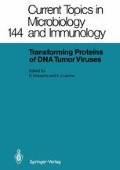Abstract
The overall phosphorylation state of p53 from normal versus transformed cells was compared by labeling cells with [35S]methionine or [32P]phosphate and isolating p53 from cell extracts by immunoprecipitation and subsequent SDS-polyacrylamide gel electrophoresis. In transformed cells both T antigen and p53 are heavily phosphorylated (Fig. 1, lane a). Phosphorylation of p53 occurs mainly at serine and to a minor extent at threonine residues (not shown). In contrast, p53 from normal cells is hardly phosphorylated (not shown). The rate of synthesis of p53 appears to be similar, whereas the metabolic stability differs considerably in both cell lines, the half-lives being less than 30 min in normal cells and more than 5 h in transformed cells. In the transformed cells. p53 seems to be converted to a second form with a slightly higher electrophoretic mobility (Fig. 1, lane c). This conversion is complete in about 5 h with a half-time of about 2 h (data not shown).
Access this chapter
Tax calculation will be finalised at checkout
Purchases are for personal use only
Preview
Unable to display preview. Download preview PDF.
References
Ami N, Nomura D, Yokota K, Wolf D, Brill E, Shohat O, Rotter V (1986) Immunologically distinct p53 molecules generated by alternative splicing. Mol Cell Biol 6: 3232–3239
Gurney EG, Harrison RO, Femo J (1980) Monoclonal antibodies against simian virus 40 T antigens: evidence for distinct subclasses of large T antigen and for similarities among nonviral T antigens. J Virol 34: 752–763
Jenkins JR, Rudge K, Redmond S, Wade-Evans A (1984) Cloning and expression analysis of full length mouse cDNA sequences encoding the transformation associated protein p53. Nucleic Acids Res 12: 5609–5626
Kalderon D, Smith AE (1984) In vitro mutagenesis of a putative DNA binding domain of SV40 large T. Virology 139: 109–137
Milner J (1985) Different forms of p53 detected by monoclonal antibodies in non-dividing and dividing lymphocytes. Nature 310: 143–145
Scheidtmann KH (1986) Phosphorylation of simian virus 40 large T antigen: cytoplasmic and nuclear phosphorylation sites differ in their metabolic stability. Virology 150: 85–95
Schneider J, Fanning E (1988) Mutations in the phosphorylation sites of simian virus 40 (SV40) T antigen alter its origin DNA-binding specificity for sites I or II and affect SV40 DNA replication activity. J Virol 62: 1598–1605
Author information
Authors and Affiliations
Editor information
Editors and Affiliations
Rights and permissions
Copyright information
© 1989 Springer-Verlag Berlin · Heidelberg
About this paper
Cite this paper
Scheidtmann, K.H. (1989). SV40 Large T Antigen Induces a Protein Kinase Responsible for Phosphorylation of the Cellular Protein p53. In: Knippers, R., Levine, A.J. (eds) Transforming Proteins of DNA Tumor Viruses. Current Topics in Microbiology and Immunology, vol 144. Springer, Berlin, Heidelberg. https://doi.org/10.1007/978-3-642-74578-2_10
Download citation
DOI: https://doi.org/10.1007/978-3-642-74578-2_10
Publisher Name: Springer, Berlin, Heidelberg
Print ISBN: 978-3-642-74580-5
Online ISBN: 978-3-642-74578-2
eBook Packages: Springer Book Archive

